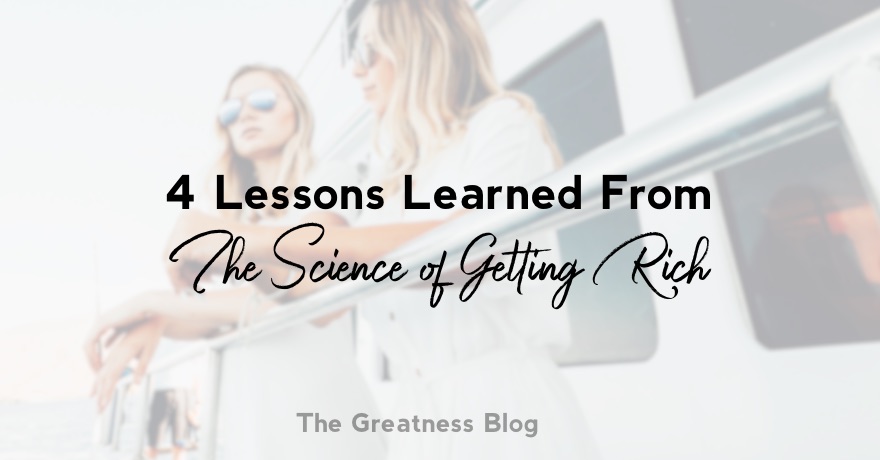4 Lessons Learned From The Science of Getting Rich by Wallace D. Wattles
The Science of Getting Rich is a masterpiece for every entrepreneur.
Too many people out there are offering ridiculous ideas on how you can become rich. Many of those ideas are about cutting back.
I can promise you that will not get rich by skipping your self-care perks or your Starbucks coffee.
Look, if you don’t have income, then there is no money to save. Don’t let anyone give you the idea that you need to skip your Starbucks coffee and save $5 a day and that will somehow turn into a fortune.
Maybe you can skip spending $5 at Starbucks every day and save $10,000 over the next five years, but if you think $10,000 is going to change your life, you’re cheating yourself. Of course you should spend less than you earn, but if you make $50,000 a year with a couple of kids, what money is there left over to save?
How can you become rich?
The Science of Getting Rich discusses the high-level psychological foundation of getting rich. At the very least, it gives you peace and hope.
You don’t need money to make money.
You need to implement some fundamental habits that will allow you attracting money by turning yourself into the correct vibration and frequency. Today I want to share 4 important lessons that will remove all kinds of fear and anxiety around your financial goals.
Lesson 1: Directing Your Thoughts
“Thought is the only power, which can produce tangible riches from the Formless Substance. The stuff from which all things are made is a substance, which thinks, and a thought of form in this substance produces the form.”
The science of getting rich starts with our thoughts.
Thoughts lead to feelings. Feelings lead to actions. Actions lead to results.
Many people admit to know of this principle but they don’t realize the power of their thoughts.
What thoughts are holding in your mind right now? When someone gives you a compliment, do you accept it? Do you see yourself as a successful person?
Start by choosing the thought or intention you want to hold in mind. Again, do you see yourself as a successful person? How does your dream life look like? What do you do on a daily basis in that version of your life?
Lesson 2: Avoiding Competition
“You are to become a creator, not a competitor; you are going to get what you want, but in such a way that when you get it every other man will have more than he has now.”
“Remember, if you are to become rich in a scientific and certain way, you must rise entirely out of the competitive thought. You must never think for a moment that the supply is limited.”
I had always considered myself an over-achiever and highly competitive until I realized this principle of co-creation and collaboration. When you focus on creation, not on beating people, you are doing things in a certain way that will lead you to a high level of success. Be your best self, and in doing so, help others be better.
What project are you currently handling? Are you competing or collaborating?

Lesson 3: Desire and Belief
“The more clear and definite you make your picture then, and the more you dwell upon it, bringing out all its delightful details, the stronger your desire will be; and the stronger your desire, the easier it will be to hold your mind fixed upon the picture of what you want.”
This is where some of the ideas around “vision boards” come from. People get too wrapped up in the idea of visualizing their goals, instead of acting on them and create these elaborate pillars to devote themselves to.
Intention has three factors influencing it which are the will, desire and belief. A Being could not act unless it Willed to Act; and it would not Will to Act, unless it Desired to Act; and it would not Desire to Act unless it obtained some Satisfaction thereby. What it is satisfied by will depend on its own nature. It’s own nature is determined by its consciousness.
Therefore the order of causation in mental creation is Consciousness >> Beingness >> Desire >> Will >> Action. The action is firstly mental action that leads to physical action secondly. I think therefore I am, therefore I desire, therefore I will conceive and carry out my plan with action to get what I desire and find satisfaction doing so.
Are your fears bigger than your faith? If you notice that you live mostly in fear, use the science of getting rich as a system to hold space for those successful moments that you are about to live.
Lesson 4: Attitude of Gratitude
Gratitude helps you feel better and see the good things in life. When combined with a gratitude practice, you will also be able to anchor that positive feeling into your brain and body, thus being able to call on that positive emotional reserve whenever you need to. The combination of leadership and gratitude is extremely powerful.
The science of getting rich has to do, not with doing certain things or following certain tactics but doing things in a certain way.
Gratitude Practice
Close your eyes. Focus on a blessing in your life… something you are thankful for. See an image of this blessing in your mind’s eye. Offer a silent “thank you” to the person or object of your blessing.
Relax into the feeling of gratitude. Take a deep breath. Feel more gratitude.
The latest brain research shows that six doses of feeling 30 seconds of gratitude daily (a whopping three minutes!) will enable your neurons to fire together and wire together around gratitude within a mere two weeks.
This means you’ll more easily and frequently access the feeling of gratitude.
Heck, we’re grateful for that!
In Closing
You have the ability to get rich. Start today by taking a simple step of holding that thought. Hold a thought of you… living the life of your dreams with ease and grace. Yes you can! Start with that thought. I’m gonna leave you with this powerful quote.
“You can never become a great man or woman until you have overcome anxiety, worry, and fear. It is impossible for an anxious person, a worried one, or a fearful one to perceive truth; all things are distorted and thrown out of their proper relations by such mental states.” Wallace D. Wattles
Let’s chat soon!

